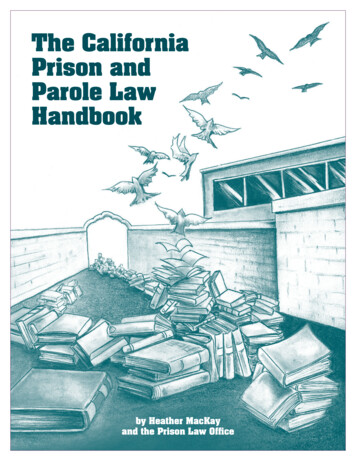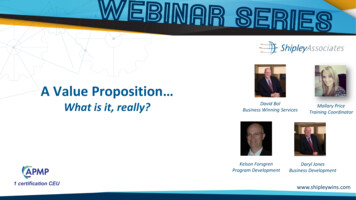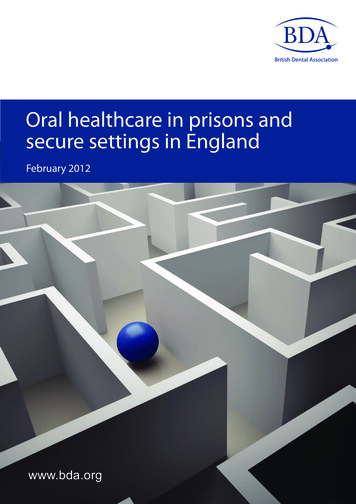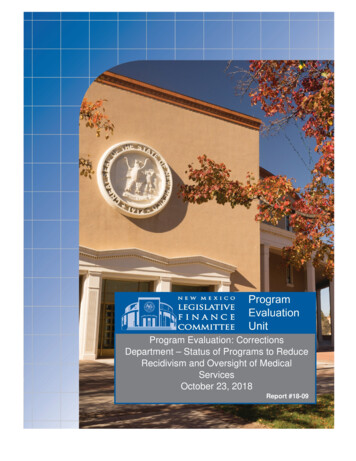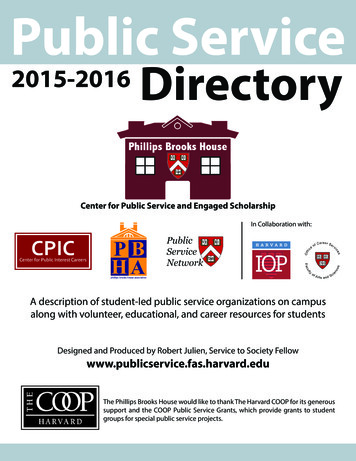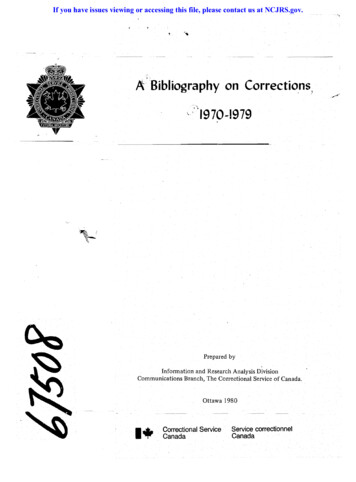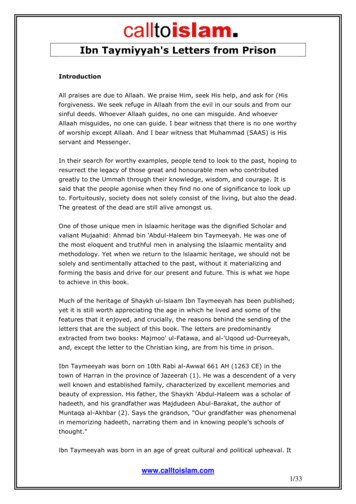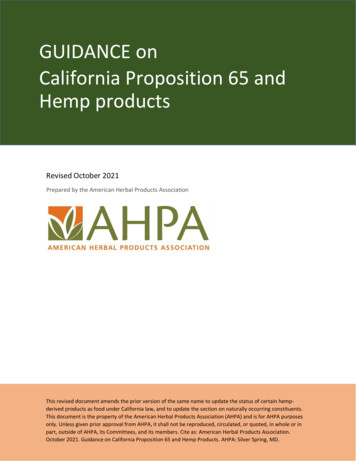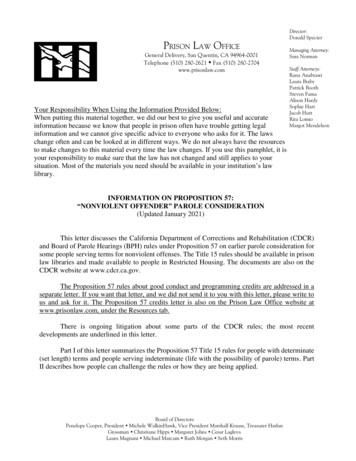
Transcription
PRISON LAW OFFICEGeneral Delivery, San Quentin, CA 94964-0001Telephone (510) 280-2621 Fax (510) 280-2704www.prisonlaw.comYour Responsibility When Using the Information Provided Below:When putting this material together, we did our best to give you useful and accurateinformation because we know that people in prison often have trouble getting legalinformation and we cannot give specific advice to everyone who asks for it. The lawschange often and can be looked at in different ways. We do not always have the resourcesto make changes to this material every time the law changes. If you use this pamphlet, it isyour responsibility to make sure that the law has not changed and still applies to yoursituation. Most of the materials you need should be available in your institution’s lawlibrary.Director:Donald SpecterManaging Attorney:Sara NormanStaff Attorneys:Rana AnabtawiLaura BixbyPatrick BoothSteven FamaAlison HardySophie HartJacob HuttRita LomioMargot MendelsonINFORMATION ON PROPOSITION 57:“NONVIOLENT OFFENDER” PAROLE CONSIDERATION(Updated January 2021)This letter discusses the California Department of Corrections and Rehabilitation (CDCR)and Board of Parole Hearings (BPH) rules under Proposition 57 on earlier parole consideration forsome people serving terms for nonviolent offenses. The Title 15 rules should be available in prisonlaw libraries and made available to people in Restricted Housing. The documents are also on theCDCR website at www.cdcr.ca.gov.The Proposition 57 rules about good conduct and programming credits are addressed in aseparate letter. If you want that letter, and we did not send it to you with this letter, please write tous and ask for it. The Proposition 57 credits letter is also on the Prison Law Office website atwww.prisonlaw.com, under the Resources tab.There is ongoing litigation about some parts of the CDCR rules; the most recentdevelopments are underlined in this letter.Part I of this letter summarizes the Proposition 57 Title 15 rules for people with determinate(set length) terms and people serving indeterminate (life with the possibility of parole) terms. PartII describes how people can challenge the rules or how they are being applied.Board of DirectorsPenelope Cooper, President Michele WalkinHawk, Vice President Marshall Krause, Treasurer HarlanGrossman Christiane Hipps Margaret Johns Cesar LaglevaLaura Magnani Michael Marcum Ruth Morgan Seth Morris
Prison Law OfficePROPOSITION 57 PAROLE CONSIDERATION(updated January 2021)I.Page 2 of 8EARLY PAROLE CONSIDERATION FOR SOME PEOPLE SERVING TERMSFOR NONVIOLENT OFFENSESProposition 57, passed by California voters in November 2016, authorizes earlier paroleconsideration for people who are serving state prison terms for nonviolent offenses.1 Pursuant tothis law, the BPH and CDCR rules provide early parole consideration for some people.Theregulations regarding early parole for people with determinate (set length) sentences for nonviolentoffenses are 15 CCR §§ 2449.1-2449.7 and 15 CCR §§ 3490-3493. The rules on early parole forpeople with indeterminate (life with the possibility of parole) sentences are 15 CCR §§ 2449.302449.34 and 15 CCR §§ 3495-3497. (See In re Edwards (2018) 26 Cal.App.5th 1181 [striking downprior rule barring third strikers from eligibility].) As of December 2020, the Board of ParoleHearings (BPH) has granted parole at about 16% of the hearings held for people with determinatesentences and 29% of the hearings for people with indeterminate sentences.An eligible person will be considered for parole suitability prior to their “NonviolentParole Eligible Date,” which is the date on which they have served the “full term” of their“primary offense,” counting pre-sentence credits for actual days served (as awarded by thesentencing court), credits for actual time between sentencing and arrival in the CDCR, andcredits for actual days in CDCR. “Primary offense” means the one crime for which the court imposed the longest prison term,without taking into account enhancements, alternative sentences, or consecutive sentences. “Full term” means the time imposed by the court for the primary offense without consideringgood conduct or programming credits earned in jail or prison. (See In re Canady (Nov. 25,2020 57 Cal.App.5th 1022 [upholding definition of full term as not including credits; note:this decision not yet final].) For example, a person serving a doubled term under the twostrikes law (which is an alternative sentencing law) for a nonviolent offense is eligible forparole consideration after serving just the ordinary base term (without the doubling or anyenhancements). For a person serving a life term under the three strikes law (which is analternative sentencing law), the full term for the primary offense is the “maximum termapplicable by the statute to the underlying nonviolent offense,” without the additional threestrikes punishment or any enhancements.1Propostion 57 adopted California Constitution, Article I, section 32, which states:(a)(1) Parole Consideration: Any person convicted of a nonviolent felony offense andsentenced to state prison shall be eligible for parole consideration after completing the fullterm for his or her primary offense.(A) For purposes of this section only, the full term for the primary offense means thelongest term of imprisonment imposed by the court for any offense, excluding theimposition of an enhancement, consecutive sentence, or alternative sentence. .(b) The Department of Corrections and Rehabilitation shall adopt regulations infurtherance of these provisions, and the Secretary of the Department of Corrections andRehabilitation shall certify that these regulations protect and enhance public safety.
Prison Law OfficePROPOSITION 57 PAROLE CONSIDERATION(updated January 2021)Page 3 of 8The first parts of the nonviolent parole consideration process – a CDCR eligibility reviewand CDCR referral to the BPH -- are similar for people with determinate sentences and people withindeterminate sentences, though there are a few differences. The person should be notified within15 business days about the decision made at each of these steps.The final parts of the process are a BPH review to confirm whether the person is eligible forNonviolent Offender Parole consideration and then a review to decide whether the person’s releasewould pose an unreasonable risk to public safety. The type of public safety review depends onwhether a person has a determinate sentence or an indeterminate life sentence. People withdeterminate sentences get a “paper” review by one hearing officer; however, the lack of a formalin-person hearing is being challenged in the courts (see Section I-C, below). People withindeterminate life sentences get a formal in-person hearing, like a regular parole suitability hearing.A.CDCR Eligibility ReviewCDCR staff should do an eligibility review within 60 days after a person arrives in theCDCR and anytime there is a change to the sentence or a new sentence is imposed. For people withdeterminate sentences, a new review should also happen if they come within one year of beingconsidered for Youth Offender Parole or Elderly Parole.A person will be deemed to be ineligible for Nonviolent Offender Parole consideration ifany of the following are true: The person is serving a sentence of death or life without the possibility of parole (LWOP); The person is currently serving an indeterminate sentence of life with the possibility ofparole for a violent felony (violent felonies are listed in Penal Code § 667.5(c)); The person is currently serving a determinate sentence for a violent felony (these are listedin Penal Code § 667.5(c)); CDCR rules also make ineligible some people who are serving a current term for a nonviolent felony if they have additional terms for violent felonies. Those who are ineligibleare: (1) a person currently serving a determinate term for a nonviolent felony prior tobeginning an indeterminate life term for a violent felony or a term for an in-prison violentfelony, (2) a person currently serving a determinate term for a nonviolent felony aftercompleting a concurrent determinate term for a violent felony. (Note: a person who hascompleted a term for a violent felony and is currently serving a separate term for a nonviolent in-prison felony IS eligible for Nonviolent Offender Parole consideration.) CDCR also refuses parole consideration to a person with consecutive determinate terms fora mix of violent and non-violent offenses, even if the person’s “primary offense” is for anon-violent felony and the violent felonies are consecutive subordinate terms. TheCalifornia Supreme Court is considering whether this policy violates Proposition 57. In reMohammad, No. S259999. We do not know when the case will be decided.
Prison Law OfficePROPOSITION 57 PAROLE CONSIDERATION(updated January 2021)Page 4 of 8 The person has any past or current conviction for an offense that requires sex offenderregistration under Penal Code § 290. This rule was recently struck down by the CaliforniaSupreme Court in In re Gadlin (Dec. 28, 2020) No. S254599. In Gadlin, the court held thatCDCR violated Proposition 57 by excluding people with either past or current non-violentsex offense convictions from Nonviolent Offender Parole consideration. We do not yetknow when CDCR will revise its regulations or start making BPH referrals for people whowere previously excluded on this basis. For a person serving a determinate sentence, the person must not be eligible for a YouthOffender Parole or Elder Parole consideration hearing within a year of the Nonviolent Paroleeligibility review and must not have an initial Youth Offender Parole or Elder Parole hearingalready scheduled.If the review indicates that the person is eligible, the CDCR determines their NonviolentParole Eligible Date (NVPED).If the CDCR decides that a person is ineligible for nonviolent offender parole, the personcan challenge the decision by filing a CDCR Form 602 administrative grievance/appeal andpursuing it to the highest level necessary.B.CDCR Referral to the BPHWhen an eligible person approaches their parole date, CDCR will refer them to the BPHfor parole consideration unless: (1) they are serving a determinate sentence and their NonviolentParole Eligible Date is less than 180 calendar days before their regular Earliest Possible ReleaseDate (EPRD) or their EPRD is scheduled for less than 210 calendar days after the date of the CDCRreview, or (2) they are serving an indeterminate life sentence and they previously had some othertype of parole consideration hearing or will be eligible for some other type of parole considerationhearing within the next 12 months after the date of the CDCR review.2A person who has concerns about the CDCR’s referral process can file a CDCR Form 602administrative grievance/appeal and pursue it to the highest level necessary.In the past, CDCR staff also did “public safety screenings,” and refused to refer people to theBPH if they had certain types of behaviors in prison. A court of appeal held that these screeningsviolated Proposition 57 because it is the job of the BPH, not CDCR, to decide whether people aresuitable for parole. (In re McGhee (2019) 34 Cal.App.5th. 902) The state did not appeal. CDCRstopped doing public safety screenings in July 2019. CDCR also referred people who had failedthe prior public screening process to the BPH for parole consideration.2
Prison Law OfficePROPOSITION 57 PAROLE CONSIDERATION(updated January 2021)C.Page 5 of 8BPH Review: “Paper” Review for People Serving Determinate SentencesThe information in this sub-section describes the “paper” parole hearing process that appliesto people serving determinate sentences who are being considered for Nonviolent Offender Parole.Sub-section D, below, describes the formal hearing process that applies to people servingindeterminate life sentences who are being considered for Nonviolent Offender Parole.When a person serving a determinate sentence is referred to BPH for Nonviolent OffenderParole consideration, the person should be notified that he or she can submit a written statement toBPH. PEOPLE SHOULD SUBMIT A STATEMENT ABOUT WHY THEY SHOULD BEPAROLED EARLY, FOCUSING ON WHY THEY WILL NOT POSE A RISK OF VIOLENCEOR CRIMINALITY. IF POSSIBLE, PEOPLE SHOULD HAVE FAMILY, FRIENDS,POTENTIAL EMPLOYERS OR OTHERS WITH HELPFUL INFORMATION SUBMITSTATEMENTS TO BPH.Within 5 business days after CDCR refers a case to the BPH, the BPH shall notify the crimevictims and prosecuting agencies about the pending parole review and give them 30 calendar daysto submit written statements.Within 30 calendar days after the notification period ends, a BPH staff member will reviewdocuments including the person’s central file and criminal history records and written statementsby the person, the person’s supporters, the crime victims, and/or the prosecutor. The BPH staffmember is called a “hearing officer” even though -- unlike other types of parole suitabilityproceedings -- there is no actual hearing at which the person or anyone else can appear. This typeof “paper” parole review is being challenged. Several superior courts have held that the BPH mustprovide in-person hearings at which the person may appear and be heard, and one of the courts heldthat there must be two hearing officers and that the person must have an attorney. However, thestate is appealing these cases, and the superior court orders are stayed pending appeal, so CDCRcurrently does not have to follow those orders. The cases are In re Flores (No. C089974) and In reKavanaugh (No. D076500). We do not know when these cases will be decided.The hearing officer will first confirm that the person is eligible for Nonviolent OffenderParole. If eligibility is confirmed, the hearing officer must then decide whether the person beingconsidered for release poses a “current, unreasonable risk of violence or a current, unreasonablerisk of significant criminal activity.” The hearing officer shall consider all the circumstances,including the nature of the person’s current conviction, prior criminal record, in-prison behaviorand programming, along with any input from the person, the crime victims, and the prosecutor. Theregulations list specific aggravating and mitigating factors to be considered. If a decision to approverelease will result in the person being released two or more years before their regular EarliestPossible Release Date (EPRD), the case must be reviewed by a higher level BPH officer who caneither approve or deny release. The written decision should include a statement of reasons and theperson should receive a copy of it within 15 business days after it is issued.Any time prior to release, a higher level BPH staff can request a review of a decision that isbased on an error of fact or an error of law, or if there is new information that would have affectedthe decision. The review must be completed within 30 calendar days after the request is received.
Prison Law OfficePROPOSITION 57 PAROLE CONSIDERATION(updated January 2021)Page 6 of 8If the original decision is overturned, a new decision and statement of reasons should be written,and the person should receive a copy of it within 15 business days after it is issued. In addition,any time prior to release, the BPH can vacate a parole grant if it is determined that the person is nolonger eligible for parole consideration. Unlike some other types of parole considerationproceedings, the Governor does not have authority to review Nonviolent Offender Parole grants.There is a strong argument that the BPH may not deny Proposition 57 parole unless there isa rational nexus between the factors cited by the BPH and a finding of current dangerousness. (SeeIn re Ilasa (2016) 3 Cal.App.5th 489 [applying In re Lawrence (2008) 44 Cal.4th 1181 to CDCR’sformer non-violent second striker parole process].)If the BPH grants release – and does not overturn or vacate the decision -- then the personshould be released 60 days after the date of the BPH release decision, following any requirednotifications to crime victims and law enforcement agencies. If the person has an additional termto serve for an in-prison offense, the additional term shall start 60 days after the BPH releasedecision. After release, the person will presumably serve the normal parole or PRCS period thatwould apply for their crimes.If release is denied, overturned, or vacated, the CDCR will review the matter after one yearto determine whether the person should be re-referred to the BPH for Nonviolent Offender Paroleconsideration.If release is denied, overturned, or vacated, the person can ask the BPH to review thedecision. This is done through a special review procedure (not the CDCR 602 process). The personcan ask for review by submitting a written request to the BPH within 30 calendar days after thedecision being challenged. A BPH officer who was not involved in the original decision willconduct a review within 30 calendar days after the request is received. The officer will either upholdthe original decision or vacate it and issue a new decision. The person should be notified in writingwithin 15 business days after the review decision is made.D.BPH Review: Formal Hearing for People Serving Indeterminate LifeSentencesThe information in this sub-section discusses the formal hearing process that applies topeople serving indeterminate life sentences who are being considered for Nonviolent OffenderParole. The hearing process that applies to people serving determinate sentences who are beingconsidered for Nonviolent Offender Parole is discussed in sub-section C, above.When CDCR refers a person serving an indeterminate life sentence to BPH for NonviolentOffender Parole consideration, the BPH has 15 calendar days to do a “jurisdictional review” toconfirm whether the person is eligible for Nonviolent Offender Parole. The BPH should give theperson a copy of the review decision within 15 business days after it is issued. If the personbecomes ineligible for Nonviolent Offender Parole any time prior to release, the BPH can reviewthe case again and make an ineligibility finding. If the BPH decides the person is not eligible for ahearing, the person can ask for review by submitting a written request to the BPH within 30calendar days after the decision being challenged (not by using the CDCR 602 process).
Prison Law OfficePROPOSITION 57 PAROLE CONSIDERATION(updated January 2021)Page 7 of 8If eligibility is confirmed, the BPH must schedule the person for a formal paroleconsideration hearing. Like other formal parole consideration hearings, this will be a full in-personparole hearing in front of a panel of BPH commissioners or deputy commissions, at which theperson will be represented by a lawyer. The same legal standard will apply as for other types offormal parole hearings – the BPH panel will consider whether the person’s “would pose anunreasonable risk of danger to society if release from prison.”The deadlines for holding hearings depend on the time between the referral to the BPH andthe person’s Nonviolent Parole Eligible Date. If the referral to the BPH happens less than 180 daysbefore the Nonviolent Parole Eligible Date, the hearing must be held within one year from date ofthe referral. If the referral to the BPH happens 180 days or more before the Nonviolent ParoleEligible Date, the hearing must be held within 60 days after the Nonviolent Parole Eligible Date.Since the BPH did not have regulations for Nonviolent Offender Parole hearings for peoplewith indeterminate sentences until January 1, 2019, it is working to catch up on hearings for peopleare already overdue for Nonviolent Offender Parole hearings. The rules require the BPH to haveheld hearings by December 31, 2020 for people who became immediately eligible for NonviolentOffender Parole consideration as of January 1, 2019, have served 20 years or more, and are within5 years of their Minimum Eligible Parole Date. The rules require the BPH to had held hearingsDecember 31, 2021 for all other people who became immediately eligible for Nonviolent OffenderParole consideration as of January 1, 2019.As with other types of formal parole suitability hearings, a Nonviolent Offender Paroledecision will not be final for 120 days and can be reviewed by higher level BPH officials. TheGovernor can ask the BPH to review a Nonviolent Offender Parole decision en banc, but theGovernor cannot himself overturn a BPH decision granting Nonviolent Offender Parole.Also, as with other types of formal parole hearings, Nonviolent Offender Parole denials willbe for a period of 3, 5, 7, 10, or 15 years, but a person may ask to have their next hearing dateadvanced if there is a change in circumstances or new information that creates a reasonablelikelihood that the person will be deemed suitable for parole.The BPH does not have an administrative grievance or appeal process for challengingdenials of parole suitability.There is a strong argument that that the BPH may not deny Proposition 57 parole unlessthere is a rational nexus between the factors cited by the BPH and a finding of currentdangerousness. (See In re Ilasa (2016) 3 Cal.App.5th 489 [applying In re Lawrence (2008) 44Cal.4th 1181 to the CDCR’s former non-violent second striker parole process].)The Prison Law Office can provide more detailed information about the formal BPH parolesuitability hearing process. The information is available by writing to Prison Law Office, GeneralDelivery, San Quentin, CA 94964, or on the Resources page at www.prisonlaw.com.
Prison Law OfficePROPOSITION 57 PAROLE CONSIDERATION(updated January 2021)II.Page 8 of 8HOW CAN I CHALLENGE THE PROPOSITION 57 PAROLE RULES OR HOWTHEY ARE BEING APPLIED TO ME?If you are denied Nonviolent Offender Parole, you should file the appropriate type of CDCRadministrative grievance/appeal or BPH request for review as described in Section I, above.If you pursue an administrative grievance/appeal or a request for review, and are notsatisfied with the responses, you can send the grievance/appeal or request and the responses to thePrison Law Office for review: Prison Law Office, General Delivery, San Quentin, CA 94964. ThePrison Law Office is interested in making sure the CDCR applies its parole rules fairly.If you pursue a request for review or an administrative grievance/appeal to the highest levelof review and are not satisfied with the responses, you can file a state court habeas petition arguingthat CDCR or the BPH is interpreting or applying its regulations in an unreasonable manner and/oris violating federal or state law.Note that although courts can review CDCR and BPH decisions regarding eligibility andsuitability for Nonviolent Offender Parole, Proposition 57 does not give courts any new authorityto independently recall commitments and resentence people. (People v. Dynes (2018) 20Cal.App.5th 523.)Free manuals on How to File a CDCR Administrative Grivance/Appeal and on State CourtPetitions for Writ of Habeas Corpus are available by writing to the Prison Law Office, GeneralDelivery, San Quentin, CA 94964 or on the Resources page at www.prisonlaw.com.
The Proposition 57 credits letter is also on the Prison Law Office website at www.prisonlaw.com, under the Resources tab. There is ongoing litigation about some parts of the CDCR rules; the most recent developments are underlined in this letter. Part I of this letter summarizes the Proposition 57 Title 15 rules for people with determinate .
